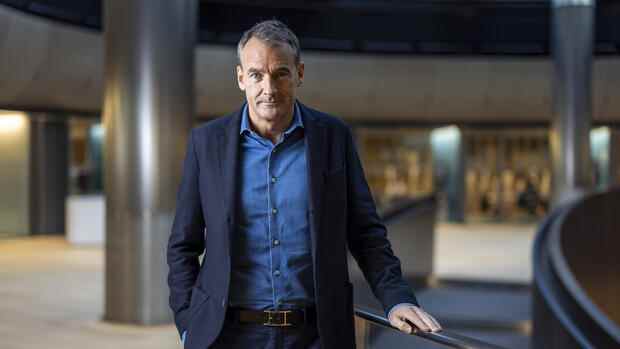The BP CEO wants to cut oil and gas production by 40 percent by 2030.
(Photo: Bloomberg)
London It is one of the greatest economic consequences of the Ukraine war: the British energy company BP is withdrawing completely from Russia after 30 years. The company announced on Sunday that it intends to sell its 19.75 percent stake in the Russian oil company Rosneft.
BP CEO Bernard Looney said in an email to employees that he was “deeply shocked and saddened” by Russia’s invasion of Ukraine. That is why the relationship with Rosneft has now been “fundamentally reconsidered”. There was a stark warning for shareholders: writedowns could be as high as $25 billion in the first quarter.
The announcement generated a tremendous response from investors and analysts in London. The stock fell 6.5 percent on Monday. But there was quick agreement that the step was unavoidable in view of the war.
Looney and his predecessor Bob Dudley resigned their positions on the supervisory board of the Russian state-owned company with immediate effect. The BP boss also sat with Russian President Vladimir Putin on the administrative body of the Russian Geographical Society. He also resigned from this post. This was a reminder that former chancellor Gerhard Schröder is still the chairman of the Rosneft supervisory board – despite growing pressure from the SPD.
Top jobs of the day
Find the best jobs now and
be notified by email.
However, even Looney had to be pushed into action. Just a few weeks ago he had defended his commitment to Russia. After all, last year Rosneft brought in $2.4 billion in profits and $640 million in dividends.
Looney was summoned to the Commerce Department
Apparently the British government also helped with the decision. Looney was summoned to the Ministry of Commerce last Friday. Minister Kwasi Kwarteng made it clear to him that there were serious doubts about the Rosneft stake. On Sunday, the BP boss made his change of heart public.
The 51-year-old started two years ago to convert the oil company into a modern energy company. He set the goal of being carbon neutral by 2050. He wants to reduce oil and gas production by 40 percent by 2030. The Rosneft exit involuntarily brings him a big step forward. The Russian business accounted for a third of the total production.
The Irishman came to BP 31 years ago straight after graduating from University College Dublin. He started out as an engineer in the Scottish oil stronghold of Aberdeen. He later worked in the Gulf of Mexico, Alaska, Vietnam and again in the North Sea. In between, he earned a master’s degree in management from Stanford University in the United States.
BP bosses are traditionally under particular public pressure, after all they run a former state-owned company that is still a heavyweight in the British FTSE leading index. Looney’s predecessor, Britain’s Tony Hayward, was forced to resign in 2010 after downplaying the explosion on the Deepwater Horizon oil rig in the Gulf of Mexico.
The biggest turning point since Deepwater Horizon
It took Hayward’s American successor, Bob Dudley, years to repair the damage to his image. BP had to pay $18.7 billion in damages. With the departure from Russia, Looney now has to manage the biggest turning point since the oil spill.
The company has not yet revealed whether it intends to sell Rosneft shares or write them off completely. First, the entire Russian business is simply removed from the balance sheet. According to analysts, it will be difficult to find a buyer.
Nevertheless, there was applause from some institutional investors. “While exiting Rosneft has a significant financial cost for BP, it’s clearly the right move,” Abrdn fund manager Andrew Mulligan told Bloomberg. The old truism now applies to Looney: every crisis also harbors an opportunity.
More: BP divests Rosneft stake

